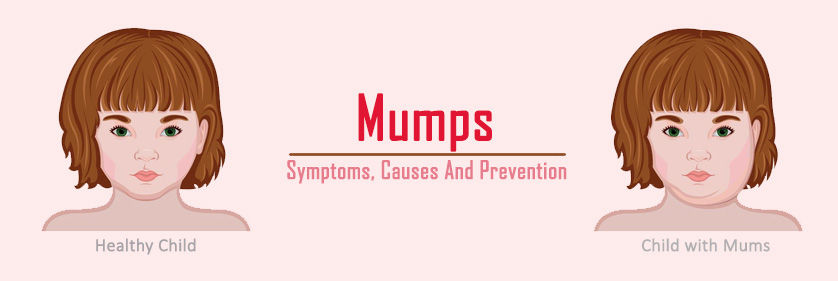Mumps- Symptoms, Causes and Prevention
Overview
Mumps is a viral infection that affects mainly the saliva-producing (salivary) glands located between your mouth and near your ears. Mumps in one or both of those glands may cause swelling.
Mumps was widespread in the U.S. before vaccination with the mumps became routine. The number of cases has shrunk significantly since then.
Mumps outbreaks, however, still occur in the United States, and in recent years the number of cases has decreased. Typically speaking, these outbreaks involve individuals who are not vaccinated and occur in close contact environments such as colleges or campuses.
Complications of mumps are potentially severe but uncommon, such as hearing loss. Mumps doesn’t get any particular treatment.
Symptoms
Some individuals who are diagnosed with the mumps virus have either no or very mild signs or symptoms. Typically they occur around two to three weeks after exposure to the virus when signs and symptoms emerge.
The primary sign of mumps is swollen salivary glands that cause puffing out of the cheeks. Specific signs and symptoms may include:
- Pain in the swollen salivary glands on one or both sides of your face
- Pain while chewing or swallowing
- Fever
- Headache
- Muscle aches
- Weakness and exhaustion
- Appetite loss
When to see a doctor
If you or your child has signs and symptoms of mumps, see your doctor. Mumps becomes highly contagious after symptoms appear for about nine days. Tell your doctor’s office before you go in that you suspect mumps and plans can be made to stop passing the virus to others in the waiting room
In the meanwhile:
- Rest as often as possible
- Try to reduce symptoms with cold compresses and over-the-counter pain relievers such as ibuprofen (Advil, Motrin IB, others) and acetaminophen (Tylenol, others)
Mumps has become rare so another disease can trigger the signs and symptoms. Swollen salivary glands and a fever could imply:
- A blocked salivary gland
- A different viral infection
Causes
Mumps is caused by a virus that spreads easily by contaminated saliva, from person to person. If you’re not immune, an infected person who’s just sneezed or coughed may contract mumps by breathing in saliva droplets. You may also contract mumps from sharing utensils or cups with anyone who has mumps.
Complications
Mumps complications are uncommon, but some may be severe.
Most complications of mumps include inflammation and swelling in a certain body part, like:
- Testicles: This disease, known as orchitis, causes the swelling of one or both testicles in males who have reached puberty; Orchitis is painful but it seldom contributes to fatherlessness (sterility) of a child.
- Brain: Viral infections such as mumps can cause the brain to become inflamed. Encephalitis can cause neurological problems and cause life-threatening consequences.
- Membranes and fluid around the brain and spinal cord: This condition can occur when the mumps virus spreads through your bloodstream to infect your central nervous system, known as meningitis.
- Pancreas: The sign and symptoms of this condition, called pancreatitis, include upper abdominal pain, nausea and vomiting.
Mumps’s other complications can include:
- Hearing loss. Loss of hearing can occur in one or both of the ears. Though uncommon, the hearing loss is permanent at times.
- Heart problems. Mumps has seldom been related to irregular heartbeat and heart muscle disease.
- Miscarriage. Contracting mumps while you’re pregnant, particularly early in your pregnancy.
- Diagnosis
- If you or your child has signs or symptoms of mumps, the doctor would possibly:
- Ask whether you or your child has been vaccinated against mumps and whether you might have been exposed to the virus
- Prescribe a blood test to check for the mumps virus proof
Treatment
A virus causes mumps so antibiotics aren’t successful. But the majority of children and adults recover within a few weeks from an uncomplicated case of mumps.
Those with mumps are typically no longer infectious and may return to work or school safely about five days after signs and symptoms appear.
Prevention
The only good way to avoid mumps is to be a vaccine against the disease. Most people have immunity to mumps once they are completely vaccinated.
The mumps vaccine is typically administered as a combined inoculation of measles-mumps-rubella (MMR), which includes the safest and most efficient type of each vaccine. It is advised to take two doses of the MMR vaccine before a child goes into school. When the infant is: Such vaccines should be given:
- Between 12 and 15 months ages
- Between four and six years ages
In particular, college students, foreign visitors and health-care staff are urged to ensure that they have had two doses of the MMR vaccine. A single dose is not fully effective for the prevention of mumps.
The third dose of this vaccine is not recommended regularly. But if you are in an area that is experiencing an epidemic, your doctor may prescribe a third dose. An analysis of a recent outbreak of mumps on a college campus found that students receiving a third dose of the MMR vaccine had a significantly lower chance of contracting the disease.
